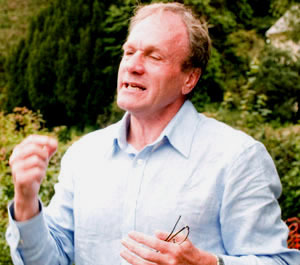Welsh historian Conway Davies welcomed by ‘cocoon’ community
By Dylan Hackett, News Editor
Last Friday, the Laura C. Muir Theatre in New Westminster hosted Welsh social historian Conway Davies for his 3rd annual guest lecture. This year, the speaker’s featured topic was “Crime and Criminality in 19th Century Wales.” The theatre was packed with faculty, students, and community members keen on what Davies had to offer, being a longtime partner and guest instructor in the five years of Douglas College’s own Wales Field School program.
“I’m beginning to doubt the intellectual capacity of some of the audience here today. This is the third time I’ve spoken here and some of you have been out to all three,” jested Davies in his opening lines.
The lecture focused on the negative social outcomes of a rapid increase in population across South Wales, induced by the nation’s economic boom-times.
“Wales of the 19th century was not like Wales of previous centuries—it had changed, as it were, in the twinkling of an eye. Population grew by leaps and bounds. We’re looking at half a million in the beginning of the 19th century, and 2.2 million by the end of the 19th century,” noted Davies. “In the bustling new economy, in both industrial and rural Wales, there were people for who malnutrition, disease, crime, and early death were each a part of their wretched, lost life.”
Notable instances were detailed in the lecture, with an anecdote from the diary of a police officer stationed in Carmarthen, home to University of Wales, Trinity St. David, host school of the Wales Field Program, portraying the vulgar reality of life in the lower crust of society.
“On one instance, in Carmarthen, on Christmas Eve, there was a furious battle in the streets between prostitutes and their pimps,” spoke Davies. A prostitute was arrested in the fray and sentenced to a period of hard labour.
Juvenile criminality was noted in the lecture to have been a major problem in Welsh society, with drunken and destitute parents becoming dependent on their children’s illicit means of living. A primary source offering evidence of this described a gang of preteen children with gang nicknames such as “Thunderbolt” and “Fireball.” Davies explained how the gradual implementation of educational infrastructure helped in mending the social ailments in 18th century Welsh society.
Davies spoke to The Other Press at the reception following his lecture and remarked on his relationship with the students and faculty he acquaints with at Douglas.
“I feel a part of the fabric of Douglas. It’s a cocoon that I come to. I recharge my batteries, meet friends, make new friends, and may it continue!”


